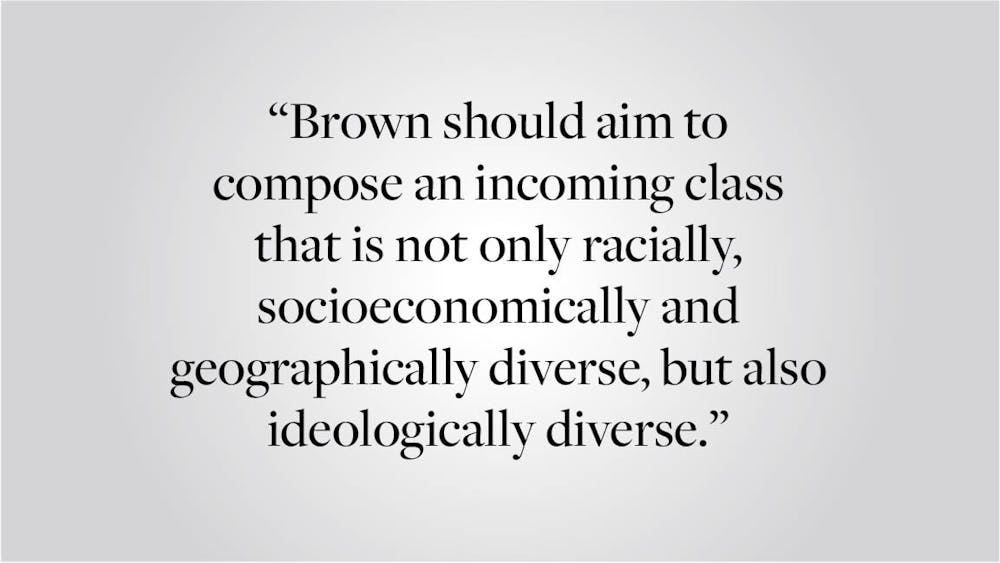Brown’s chronic lack of countervailing viewpoints both within the student body and among faculty is unbecoming of an institution supposedly committed to diversity and inclusion.
Put differently, it is difficult to understand how students could possibly receive a well-rounded education at Brown when the College’s faculty and student body are almost all in ideological lockstep with one another. Just as it is the mark of an educated mind to be able to entertain a contrarian thought without accepting it, a serious university must earnestly contend with heterodox views without caricaturing or condescending them. The often-cited Kalven Report from The University of Chicago, a document affirming the value of academic freedom and universities’ neutrality on political issues, encapsulated this pedagogical imperative when it succinctly clarified that: “In brief, a good university, like Socrates, will be upsetting.” John Stuart Mill also famously touched on this point in the second chapter of his book “On Liberty,” when he asserted that “however true (a popular or strongly held opinion) may be, if it is not fully, frequently and fearlessly discussed, it will be held as a dead dogma, not a living truth.”
Adding further testimony to the significance of intellectual diversity, the celebrated Brown Professor Alexander Meiklejohn was wise to note that citizens can only make the best decisions for themselves and for their communities when they are provided with a variety of viewpoints, enabling the most inclusive and dispositive public deliberation. Using Meiklejohn’s logic, it follows that students deserve to be exposed to as broad of a range of relevant perspectives as possible, so that they may make well-informed decisions — both on College Hill and beyond.
But there is no such broad range of political views at Brown. The overwhelming majority of the student body identifies as left-leaning. And when it comes to the faculty, there are only a handful of libertarians or conservatives, and hardly any of them are outspoken. Sure, John Tomasi, whose research and writing concern libertarian ideology, held views markedly different from the liberal consensus on campus, advocating for free speech on campus for the 27 years he taught at Brown before leaving to lead the Heterodox Academy. And I give Professor of Economics and Social Sciences Glenn Loury full credit for bravely and vehemently speaking against affirmative action as a Black conservative. That said, it will take far more than one outspoken economics professor to balance out Brown’s lopsided academic culture and reduce its susceptibility to unreflective groupthink.
Here are three actionable remedies the University can pursue to mitigate this problem.
First and foremost, it is imperative that Brown seeks out some esteemed conservative and libertarian faculty members to hire in order to diversify the teaching and curriculum offered by the College. Former Visiting Professor of Political Theory Steven Calabresi, who (among many other things) clerked for the late Justice Antonin Scalia on the U.S. Supreme Court, epitomizes the type of scholar Brown should focus on attracting. Particularly in the departments within the humanities and social sciences, hires like Calabresi would give rise to new course offerings that would expose students to viewpoints they might not otherwise encounter during their four years on College Hill. This change would also enable the possibility of a right-leaning academic advisor who could attend to the nuanced needs of ideological outliers on campus who do not identify with Brown’s culture of political progressivism. Lastly, this change would unlock research possibilities and theses that are more suited for nonconformists — and render such opportunities far more accessible than they are to so-called outliers today.
Secondly, the College faculty ought to cooperate more with student organizations from across the political spectrum, such as the Brown Federalist Society, to help it achieve its mission of sponsoring fair, balanced and open campus debate with dissenting guest speakers. This is especially needed with respect to conservative speakers, who — according to a 2017 analysis by SPEAK, a Brown student group seeking to bring politically diverse speakers to campus — are much less likely to otherwise be invited to speak on College Hill. This should not be taboo. At the very least, participation in civil discourse with such guests provides Brown faculty opportunities to clarify positions they have taken in their recent research and publicly available work. At best, sustained faculty engagement in debate could earn them praise from the Brown community for their candid willingness to defend their positions in front of a live audience.
Thirdly, the Office of Admission ought to make a transparent and concerted effort to increase outreach to applicant pools likely to contain top-caliber candidates from less mainstream educational backgrounds — who tend to be more conservative. Put differently, Brown should aim to compose an incoming class that is not only racially, socioeconomically and geographically diverse, but also ideologically diverse. This change would benefit the entire institution, but especially the liberal majority of students who are currently robbed of the valuable opportunity to have their arguments stress-tested (and ultimately fortified) by opposing perspectives.
The implementation of these three changes would signal to the rest of the world that Brown truly embraces diversity and inclusion, and furthermore, that it is authentically committed to academic excellence — which can only be maintained via fostering a vigorous debate culture. The choice is entirely Brown’s. Will the University administration secure a promising future by reaffirming its founding pedagogical principles and reminding everyone of its original mission? Or will Brown resist any such revamping and remain an echo chamber that is likely to intensify? Time will tell.
Thomas Bickel ’22 is the founder of the Brown Federalist Society. He can be reached at thomas_bickel@alumni.brown.edu. Please send responses to this opinion to letters@browndailyherald.com and other op-eds to opinions@browndailyherald.com.





